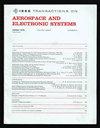时序超前RAIM的初步探索与验证
IF 5.7
2区 计算机科学
Q1 ENGINEERING, AEROSPACE
IEEE Transactions on Aerospace and Electronic Systems
Pub Date : 2025-04-28
DOI:10.1109/TAES.2025.3564920
引用次数: 0
摘要
本研究对授时先进接收机自主完整性监测(T-ARAIM)算法进行了初步探索,该算法可使接收机局部检测并排除故障,从而提高授时方案的可靠性。T-ARAIM算法建立在基线ARAIM算法的基础上,在风险预算分配、时间解决方案估计和时间保护水平(TPL)计算三个关键方面进行了修改。这些修改使得T-ARAIM算法只关注时序解而不是定位解。T-ARAIM既可以估计接收机坐标和系统间偏差(ISB),也可以将它们固定为常数。固定接收机坐标和ISB显著增加了观测的冗余性,极大地提高了T-ARAIM的可用性。为期10天的仿真实验表明,在固定接收机坐标的情况下,T-ARAIM即使使用单个星座也能实现全局可用性。实际观测结果表明,TPL可以完全约束各实验站的定时误差。固定接收机坐标可提高授时精度,并将TPL降低约12 ns,显著提高T-ARAIM的可用性。固定ISB可减少约2ns的TPL,对定时解决方案的精度几乎没有影响。模拟实验结果与实际观测结果具有较好的一致性。本文章由计算机程序翻译,如有差异,请以英文原文为准。
Preliminary Exploration and Verification of Timing Advanced RAIM
This study conducted a preliminary exploration of the timing advanced receiver autonomous integrity monitoring (T-ARAIM) algorithm, which enables receivers to detect and exclude faults locally, thereby enhancing the reliability of timing solutions. The T-ARAIM algorithm builds upon the baseline ARAIM algorithm, incorporating modifications in three critical aspects: risk budget allocation, timing solution estimation, and timing protection level (TPL) calculation. These modifications enable the T-ARAIM algorithm to focus solely on timing solutions rather than positioning solutions. T-ARAIM can either estimate the receiver coordinates and intersystem bias (ISB) or fix them as constants. Fixing the receiver coordinates and ISB significantly increases redundancy in observations, greatly improving the availability of T-ARAIM. A ten-day simulation experiment indicates that with fixed receiver coordinates, T-ARAIM can achieve global availability even using a single constellation. Experiments using actual observations indicate that TPL can fully bind timing errors of all experimental stations. Fixing receiver coordinates improves timing accuracy and reduces TPL by approximately 12 ns, significantly enhancing the availability of T-ARAIM. Fixing the ISB reduces TPL by approximately 2 ns with almost no impact on the accuracy of timing solutions. Results from both simulation experiments and experiments using actual observations demonstrate good consistency.
求助全文
通过发布文献求助,成功后即可免费获取论文全文。
去求助
来源期刊
CiteScore
7.80
自引率
13.60%
发文量
433
审稿时长
8.7 months
期刊介绍:
IEEE Transactions on Aerospace and Electronic Systems focuses on the organization, design, development, integration, and operation of complex systems for space, air, ocean, or ground environment. These systems include, but are not limited to, navigation, avionics, spacecraft, aerospace power, radar, sonar, telemetry, defense, transportation, automated testing, and command and control.

 求助内容:
求助内容: 应助结果提醒方式:
应助结果提醒方式:


